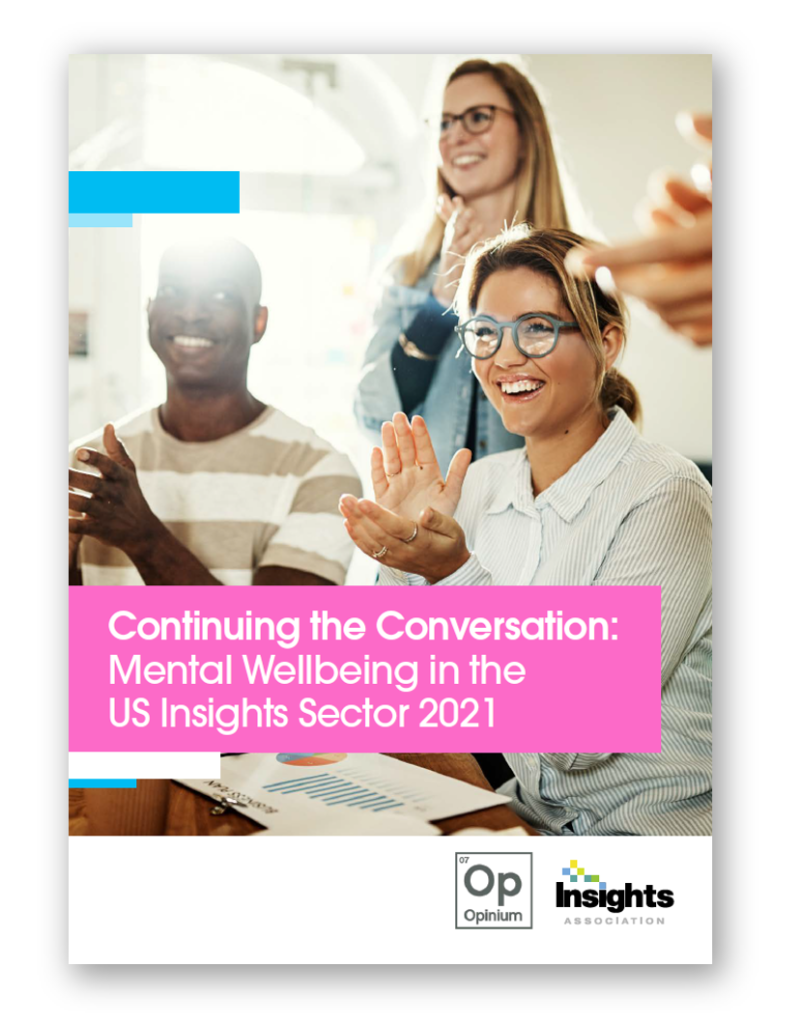Continuing the Conversation: Mental Wellbeing in the US Insights Sector 2021

As pandemic issues persist and social and political unrest weighs heavily on our minds, our study tracks the state of mental wellbeing in our industry and seeks to identify underlying issues.
Opinium designed its Workplace Mental Wellbeing Audit to help businesses and other organizations understand the mental health of their employees and, in turn, take steps to help them. We surveyed 258 research and insights professionals through the Insights Association network, with the aim of understanding the mental wellbeing of those working in the industry and the impact of the pandemic, and changes in reported wellbeing over time.
Throughout the report, we compare to last year’s survey of US research and insights professionals, to understand changes over time, as well as our normative database of national US workers, to understand how the industry fares in comparison to others.
Among many notable data points in the study…
Deadlines and workload remain leading stressors; COVID issues ease markedly
What causes research professionals stress at work? More than half (53%) stated that impending deadlines/targets cause stress – making it the top source – compared to 48% last year. This is closely followed by a workload that is too much to handle (52% vs. 47% last year). One stark difference between this year and last is that pandemic-specific issues are no longer considered a top source of stress. In 2020, 45% felt the pandemic was a leading source of stress in their work life. This dropped significantly in 2021 to 22%.
Social and political issues are causing immense stress on employees
Eight in ten are stressed by political unrest (82%), over three-fourths due to race issues (77%) and the pandemic (73%), and two-thirds over economic downturn (64%). Nearly two-fifths (36%) feel very stressed from political unrest.
Many benefit from working from home, but struggle to draw boundaries
Respondents to the survey enjoy several benefits from working at home, top among them: Feeling more relaxed (72%), omission of commute improving mental health (70%), and better work-life balance (57%). These are offset by certain challenges, namely: Struggle to build in time to get outside during the day (60%), difficulty drawing boundaries between work and rest (55%), and working longer hours (49%).
Employers take Mental Wellness seriously; Fewer workers reveal problems
Across the insights industry more than nine in ten employers are proactive in well-being support and offer initiatives to support employee mental health (93%). This is up from last year (90%) and continues to track well above the workforce average within the U.S. (77%).
The percentage of respondents who told someone at work about their mental health dropped slightly from 58% last year to 55% this year. Two reasons cited for not opening up jumped significantly year over year – Concern it would jeopardize career: +14% and Didn’t know how to talk about it: +9%.
We are extremely proud to be able to share this report with you, which we hope will inspire insights teams across the US to take small steps towards improving mental wellbeing in their organizations.





